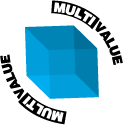Interview with Kelly Bleck of Precision Solutions
We're talking with Kelly Bleck of Precision Solutions. When Kelly first came to our attention, we were intrigued with the idea of someone with no formal training in programming becoming a qualified MultiValue developer. While a lot of of our older contingent started that way in the 1970s, we thought you would enjoy hearing the opinions of someone who accomplished that more recently — in the current millennium, to be precise.
Spectrum: We understand that your background and training is in journalism, not computer programming. Is this correct?
Kelly: Correct — strange I know. I had a little experience with PHP and web design through my journalism college courses, but I had not had any experience with MultiValue or programming per se.
Spectrum: That is quite a bit different than the background of most newcomers to the MultiValue database environment. How did you come to be a MultiValue application developer?
Kelly: I found an employer who was willing to teach. Being that I came from a journalism background, I was essentially a clean slate — no previous coding experience, no "bad habits," no prior biases. So I was very malleable and could be trained to do my job exactly the way it needed to be done.
Spectrum: What do you think of the MultiValue database? Did you find it difficult to learn?
Kelly: For me, personally, no. I have always enjoyed problem solving and puzzles, and that is how I have approached learning about MultiValue databases. Everything works together in a very particular way, and new programs can be integrated easily — if you know where and how to integrate them. This discovery and analysis is something I thrive on.
Spectrum: What did you think of the MultiValue data model with everything being variable length and these multivalue and subvalue nested things? Did that seem odd at first?
Kelly: I did think the MultiValue data model was strange at first. But now I think of it as a pretty efficient... storage system, I guess you could say. You're able to have much more information that can relate to a variable number of other pieces of information. It allows for a very wide range of information storage and program availability. Much more fluid and accessible.
Spectrum: And what about the MultiValue Basic programming language? How much trouble did that give you?
Kelly: It was challenging at first, because you are literally learning a new "language." Being a writer I have quickly picked up on the rules — it's like picking up a new writing style. My journalism background has helped immensely with my attention to details, which is necessary when using so many variables in one program. I am a natural editor, so I catch my mistakes (at least I like to think most of the time) and review my programs and applications with a very critical eye. Overall, I've learned it's about repetition; repeating certain phrases, loops, executions that helps me retain the most information.
Spectrum: What would you say was your biggest challenge learning to develop business applications on this platform?
Kelly: Understanding the client's business model was the hardest to grasp. I wanted to know why people wanted these programs, what the purpose was for them, and how this integration would benefit their business. This is a rare thing to gather from your clients — most requirements are bare-boned and minimal, leaving a lot to our interpretation. I wanted to be more involved with the clients, which I luckily have found with Precision Solutions.
I guess being an interviewer in my previous life has made me want to be much more involved with those I'm serving.
Spectrum: Do you have any advice for others who would like to learn to develop MultiValue applications?
Kelly: Be open minded. That's the easiest thing to say and the hardest thing to practice. Understand that programming and MultiValue systems are all about rules (at least that's what I've learned), and these rules do not necessarily fit with those you have been taught previously (be it from a programming, a journalism, or even a business background). The technological world is changing rapidly, and we must change with it. It's no longer good enough to fix old programs and applications; new programs have to be created, developed, and perfected. It's a large, scary business. But it's a rapid, fast-growing, and exciting one at the same time. Be prepared to learn techniques you never thought you would, and be sure to take on the good practices of those who have already developed so much of this technology.
Spectrum: What comes next? Is there any particular technology that you are interested in expanding into?
Kelly: Mobile. We're already developing mobile applications for Prelude users.... but there's so much potential! Mobile is infiltrating warehouses, and it is being used as one of the main forms of communication between corporations. People are constantly on the move, and they need their business at their fingertips. Developing mobile tools that can connect them directly to necessary information is pertinent. And, heck, mobile technology is just plain fun to work with.


